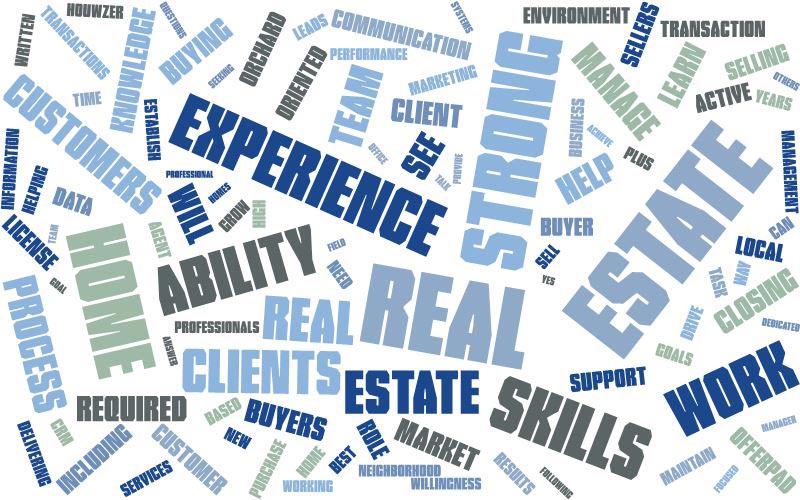8 Skills All Successful Real Estate Agents Have
What are the skills needed to be a real estate agent? Or better yet, thrive as a real estate agent?
To answer this question, I looked at real estate agent job listings. What are some of the most common skills that brokers and sales managers are looking for in real estate agents?
From that, I got the word cloud below.

Taking an even deeper dive into job descriptions, and my own personal experience as a licensed Realtor in Texas, these are the most important skills you can have as a real estate agent:
- Goal-Oriented
- Attention to Detail
- Self-Motivated
- Interpersonal and Communication Skills
- Ability to Multi-Task and Manage Priorities
- Enthusiasm for Learning and Technology
- Local Market Knowledge
- High Ethical Standards
Basic Qualifications
Just to get your license, most states have minimum qualifications.
- United States citizenship or resident
- 18 years of age or older
- meet minimum character requirements (depending on the State)
Obviously these aren’t skills. But if you qualify on all 3, then great work! You are well on your way to becoming a real estate agent!
Speaking of which, one of the great things about real estate is that you don’t need a lot of previous experience. It is a path where anyone with some passion and drive can turn it into a lucrative and rewarding profession.
So while the following skills will be essential, you don’t need any formal background beyond a high school education to absolutely crush it.
Goal-Oriented
It’s extremely easy to spin your wheels as an agent.
You can spend a whole year doing the wrong thing before you figure it out.
Setting goals and measuring your progress toward that goal is essential to success and staying focused. You will have bad days as an agent. If you are not keeping your goals in mind, it will be easy to get side-tracked or fall into the temptation of chasing a shiny new object.
Develop a few simple goals and break them into weekly activities. Diligently track your progress every week.
Attention for Detail
Attention-to-detail is about more than just protecting your brand and looking high-speed.
It’s about CYA! Cover Your A**.
A real estate agent is the main point of contact for $100,000 and even $1M transactions. Agents are working with clients to fill out promulgated forms. Bad advice, an incomplete contract, a missed deadline, can mean destruction.
Clients aren’t dumb. They are using an agent because they want a professional. They will be especially attuned to “little” mistakes you make like spelling errors, because those kinds of mistakes can demonstrate whether they can trust you not to make bigger mistakes.
Detail-oriented was a recurring skill set on real estate agent job advertisements.
Self-Motivated
As a real estate agent, you are (usually) an independent contractor. A 1099 employee.
If you fail, it isn’t going to hurt anyone very much except you.
Therefore, while selecting a good broker and forming accountability groups is great, your motivation ultimately must come from within.
Even in salaried and team roles, a self-motivated team lead is going to want buyers and listing agents who can maintain enthusiasm.
You also will seldom have a team lead or broker peering over your shoulder helping you along. You need to have the gumption to be able to matters into your own hands and figure things out for yourself more often than not. And ensure that your time is being spent productively.
You are not a real estate agent. You are a small business owner.
In real estate agent job descriptions, the words “self-motivated”, “self-managed”, and “entrepreneurial” recur over and over again.
Interpersonal and Communication Skills
Real estate is a people business. It’s very unlikely you are going to make it far without interpersonal skills.
While that doesn’t mean you have to be an extrovert, you definitely need to be able to listen and empathize with potential clients. No two clients have the same needs.
I was shocked how often I would hear from a lead who had been working with another agent, but was frustrated because she was showing them homes that they didn’t want. She wasn’t listening to them.
Put your real estate clients first and don’t assume you know better. Make recommendations that fit their needs and not your own.
Real estate professionals also need emotional maturity. Real estate has high-highs and low-lows. You will run into great people and some of the toughest people you’ve ever met. Handling those situations professionally and dispassionately will be critical to maintaining your own peace and also your business.
Ability to Multi-Task and Manage Priorities
To be honest, this was a struggle for me.
I work best by getting “in the zone” for several hours on end, without interruption. It’s hard for me to hop in and out of things.
That is a luxury I cannot afford in real estate, where you are taking phone calls, putting out transaction fires, responding on social media, driving to last minute showings, and writing offers on a home that just hit the market. You seldom have much control over your day, it seems.
Letting it get away from you can spell disaster with missed connections, messy transactions, and lost deals.
If your real estate career is going to last, you need to thrive on daily variety and excitement. You need to stay focused on money making activities while ignoring the distractions. And you need to be efficient with some basic time management skills.
Enthusiasm for Learning and Technology
The real estate environment is constantly changing. There are major new disruptors and trends taking shape.
This video from Andreessen Horowitz puts in perspective where the residential real estate industry is today. A plurality of real estate agents do 0 deals in a year!
Being mindful of the changing technology landscape around you isn’t enough. Your clients are becoming more and more tech-savvy, and their expectations are rising. Simple things like e-signatures, paperless transactions, a functional website, and basic software to ironclad your follow-up will be essential to earning and maintaining customers.
I’ve built a list of what I recommend for your minimum tech stack.
Local Market Knowledge
Unlike multi-tasking, I am great at knowing my real estate market, a critical skill for a successful agent.
I spend lots of time in my MLS pulling data for zip codes, playing with fields, and making graphs and charts for my website. I know the neighborhoods in my local community pretty darn well if I say so myself.
Taking that knowledge into a listing presentation or in a conversation with a buyer was a major part of my success. I have basically no personality, but my clients and investors come to me because I know my stuff.
Even highly personable agents will watch their credibility disappear if they don’t know basic features of their market. Not knowing your market will keep you from setting expectations with buyers and sellers. It will hamper your negotiation skills. And it will never earn confidence.
High Ethical Standards
I haven’t been sued yet, knock on wood. But it sure frightens me.
“Being ethical” may sound obvious and easy. “Just don’t be bad”. But it can be a lot more complex than that.
Messy, gnarly real estate transactions happen all the time when buying or selling a house. Sometimes the nice thing you would like to do conflicts with your fiduciary duty. Or sometimes your fiduciary duty conflicts with your ethical responsibility. Even a good real estate agent can be sued or struggle with ethical dilemmas.
Maintaining “strong ethical standards” and the “highest standards of ethics” is a recurring theme in real estate agent job descriptions. No wonder, considering that ethical lapses can often take down not only an agent but an entire brokerage.
Conclusion
If you think you have what it takes to be an agent, the next step is to start learning more real estate agent skills! I created the following resources on how to self-teach yourself about the real estate industry:
Meanwhile, I’ve written some articles for newer agents on how to avoid some of the same mistakes I did when starting out.
- Every Real Estate Software Tool you Need Getting Started
- 23 Things New Real Estate Agents Waste Money On
- New Real Estate Agent Success Checklist
I hope these set you on a path to a rewarding and successful career in the real estate business!


